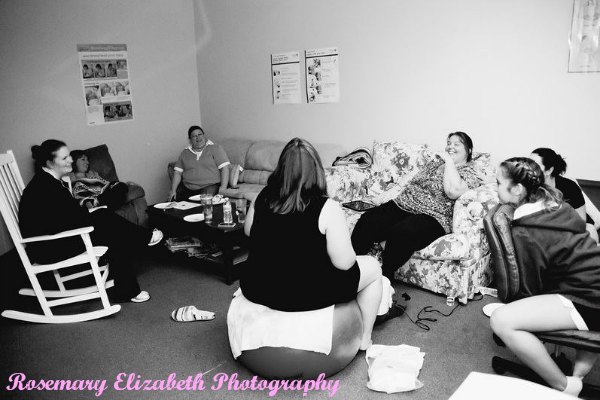Rotary International’s Maternal Health Initiative in Haiti
Oftentimes, in America, we take for granted that we have the freedom to choose our prenatal care providers. I feel blessed to live in an area with such wonderful midwives and doulas, that just about everywhere you turn, informed care is at our fingertips. Although, many women choose to go a different route with their births, and not all obstetricians are natural or non-intervention friendly, moms have the right to educate themselves and choose their care providers.
With the birth of my children, I educated myself a little more with each one. With Kylie, although, I went into labor, I was young, and let the doctor talk me into a pitocin and (failed) epidural birth, because he was leaving for a ski trip the following morning. With Braxton, I scheduled an induction but had a horrible experience with the anesthesiologist, and decided from that day forward, any other children would be birthed naturally. My last two babies were born, medication free, in a birthing center with a midwife and doula(s). I was fortunate to have excellent prenatal care, and healthy pregnancies with all four.
I can imagine, that the birth of my fourth baby was much like a birth experience of the moms in Haiti in some ways. We had very little interference from the outside world. I was surrounded by my friends, fellow doulas, midwives, and family. At one point during my labor, all phones, tvs, devices, and distractions aside, we all just sat around telling stories, talking, and bonding. I even sang a song while sitting on a birthing ball riding out the waves of my contractions. The bonding was just about the highlight of my birthing experience, until and my oldest child was the one who caught son when he was born. That was a very precious moment. She has a experience to cherish and a story to tell that none of her friends will ever be able to fathom. For more on Jett’s birth, view his birth story.

Rotary International’s Maternal Health Initiative in Haiti
Rotary International helps educate women internationally about the importance of prenatal care and the risks of childbirth without it. Prenatal care is extremely important to help lower the number of maternal and infant deaths.
Rotary is an organization of business and professional leaders who provide humanitarian service and help to build goodwill and peace in the world. There are 1.2 million Rotary members in 34,000 Rotary clubs in more than 200 countries and geographical areas. Rotary clubs have been serving communities worldwide for more than a century. The first Rotary club was founded in Chicago in 1905. For more information, visit rotary.org
Did you know that the infant mortality rate in Haiti is the highest in the western hemisphere, even though over 91% of women have homebirths. Midwives for Haiti and Rotary International have mobile prenatal clinics to help pregnant women in Haiti get the care they desperately need.
Why Maternal Health?
With proper services and trained birthing professionals, maternal deaths at childbirth could be reduced by 80 percent. Rotary’s maternal and child health projects help educate mothers, provide health services such as immunizations, and give babies a better start in life.
For first hand experience, check out this Haiti volunteer video, that takes you into an area of Haiti where it’s mostly inaccessible without the help of the Pink Jeeps.
Facts from Midwives of Haiti:
 The Ministry of Health in Haiti has recognized that due to distance, transportation, and lack of information, many women do not get to medical facilities in time to save their lives.
The Ministry of Health in Haiti has recognized that due to distance, transportation, and lack of information, many women do not get to medical facilities in time to save their lives.
The chances of dying from childbirth in Haiti in 2010 were estimated by the WHO as 1 in 28, mostly due to pregnancy-induced-
Seventy-six percent of Haitian women deliver their babies without a skilled attendant. Increasing the number of skilled birth attendants has been proven to reduce maternal mortality.
Infant Mortality
- US – 6.3 / 1,000
- Haiti – 48.8 / 1,000
Maternal Mortality
- US – 8 / 100,000
- Haiti – 520 / 100,000
What Rotary is doing to promote Maternal and Child Health in Haiti:
- Rotary International, the world’s largest service organization, is working toward improving Maternal and Child Health worldwide as one of its key areas of focus.
- In partnering with Midwives of Haiti, donations from Rotary have allowed the organization to train additional midwives, provide supplies and purchase all-terrain vehicles.
- Many pregnant women have no access to prenatal care because of inaccessible terrain. By increasing the number of all-terrain vehicles and additional trained staff, pregnant women in Haiti could have access to a trained professional once a month.
To learn more about this initiative, and to get involved, visit the following sites:
Donations to Midwives for Haiti
Disclaimer – I was asked to write about my birth experiences and share info about Rotary and Midwives for Haiti. All opinions are my own.

I had no idea that the mortality rate in Haiti was so high! I think it is great that Rotary International is doing so much to help lower that rate, and protect both woman and their babies.